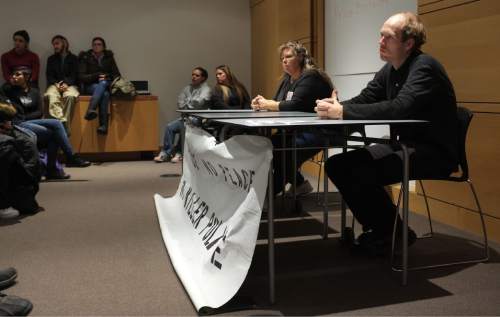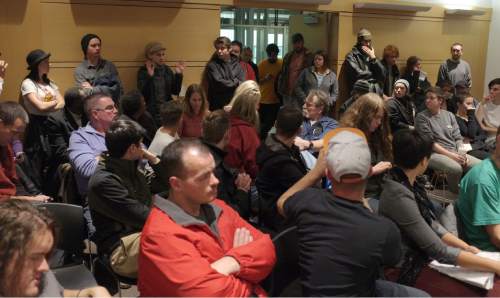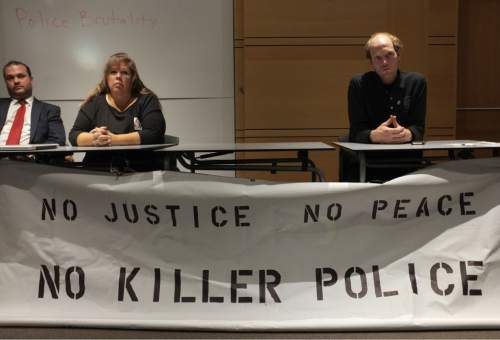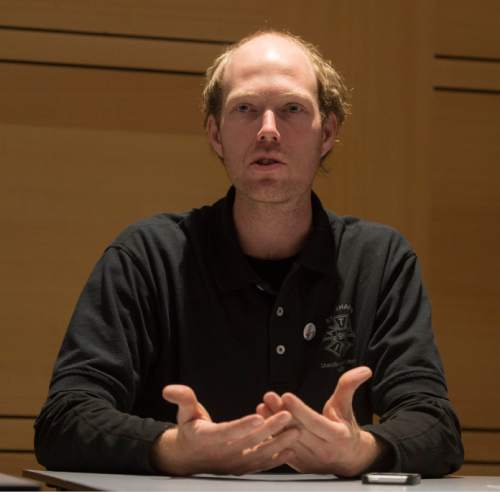This is an archived article that was published on sltrib.com in 2014, and information in the article may be outdated. It is provided only for personal research purposes and may not be reprinted.
A hodgepodge of grieving families, students, civil rights activists and attorneys who gathered Wednesday to discuss ways to reduce forceful police tactics looked for inspiration from a recent unlikely victor in Utah policy — the LGBT community.
"Equality Utah, when they got started, … was just a bunch of angry gay people. That grew into something," ACLU policy advocate Anna E. Brower told the 70 people crowded into a Salt Lake City library meeting room. "What is exciting about seeing this group here, … is that you're grassroots."
The group Utah Against Police Violence set up Wednesday's meeting to try to decide how those roots should grow after a spate of shootings by police in recent months galvanized a small but growing movement of people who agree Utah law enforcement has become too aggressive — but disagree on what to do about it.
Group organizer Chris Manor pointed to policy options, including legislation, similar to a law passed in Wisconsin, requiring all deadly force cases to be investigated by an agency other than the one whose officer used the force.
Civilian oversight options should be explored, and the group could campaign for representation on the two civilian boards that review police complaints and uses of deadly force in Salt Lake City and West Valley City, said Kelly Fowler, an attorney for the family of Dillon Taylor, who was shot to death by Salt Lake City police in August.
"Who's on the review board? Who are these citizens?" Fowler asked. "What we need to think about is having a voice in what types of people are on the boards so we have balance and non-affiliated people on those parties once they're formed."
But others said they first need to win the hearts and minds of fellow Utahns who, as Karl Winsness said, "think no matter what the police do, they're justified in doing it, and anyone who says anything about it is automatically a cop hater."
Bud Johnston noted that the turnout at protests is low, even though the assortment of Facebook groups and memorial pages for those who were shot gain followings of hundreds or sometimes thousands.
"Rallies are not cool in Utah," Johnston said. "It's not cool to stand for what we stand for. It's not cool to go to a rally."
Social media strategies could broaden the movement, said Linda Spencer. She pointed to a Twitter campaign by the loose online group Anonymous, on behalf of Darrien Hunt, whose fatal shooting in September by Saratoga Springs police became a national controversy. The hashtag #OpDarrienHunt now has 38,000 followers.
Others suggested chronicling stories of Utahns who say they were subject to police harassment or excessive force.
"There are so many facts that people don't see," said Gina Thayne, Taylor's aunt and "proxy mom" since both of his parents died when he was a teenager.
Thayne and her attorneys released new information in Taylor's shooting, playing for the group audio of the 911 call in which a resident told dispatchers that a man matching Taylor's description was "flashing" a gun.
The call led Officer Bron Cruz to believe Taylor was grabbing a gun when he found Taylor with his hands in his pants at a South Salt Lake 7-Eleven; Cruz shot him when he pulled out his hands. Taylor, in fact, was unarmed.
On the recording, the caller tells the dispatcher that Taylor had the gun in a pocket, when somebody with her can be heard correcting her that "something" was in his pocket.
"I want to know if that was relayed to the officer or not, because if it was not relayed to the officer and he's left to think to himself, 'For sure there's a gun,' and 'something' means it might not be a gun — that's a huge failing," Fowler said. "Little distinctions, but they meant someone's life."
Salt Lake City police have so far denied the family's attorneys' requests for the recording of the call in which dispatchers relayed the details from the 911 call to police, Fowler said.
"We're losing our loved ones and we're losing our rights," Thayne said.
Robert Cummings, one of Thayne's attorneys, advised the group to keep a long view.
"This is a marathon, not a footrace," he said.









